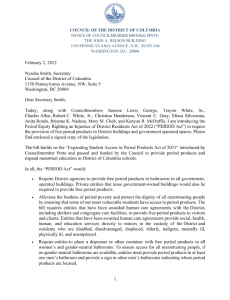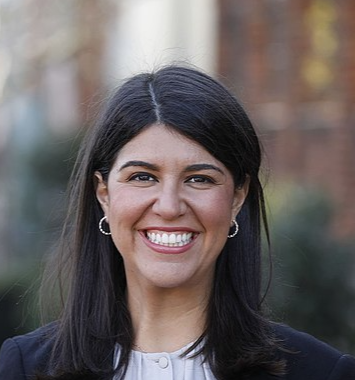The Washington D.C. Council’s Committee on Housing and Executive Administration is expected on Friday to mark up legislation that would provide free period products in all women and gender-neutral bathrooms in government-owned and operated buildings.
Kevin Chavous, a spokesperson for committee chair Anita Bonds (D-At Large) said the bill was expected to pass the committee.

The bill is sponsored by Councilmember Brooke Pinto (D-Ward 2) and builds upon her previous bill, the Expanding Student Access to Period Products Act of 2021, which was passed unanimously earlier this year.
That required all public, public charter, private schools, and post-secondary institutions to provide free period products to students. The legislation also required the creation and implementation of a menstrual health education standard by the District’s State Office of the Superintendent of Schools (OSSE).
“The inability to access period products can create serious health consequences,” Pinto said Oct. 4 in a public hearing notice on the new bill. “Women, transgender men, and non-binary people who lack access to menstrual products are more likely to reuse products or use products for too long, which puts those individuals at higher risk for infection and other conditions that require medical care.”
Pinto’s Period Act seeks to alleviate the “period poverty” experienced by many of D.C.’s most vulnerable residents, such as the unhoused, the councilmember said.
All entities in the District that have been awarded human care agreements, which include shelters and care facilities, would be required to provide free period products. These human care agreement recipients provide services to a number of demographics, from minors in the custody of the District, to residents that are disadvantaged, disabled, elderly, and unemployed.
Another aspect of the bill would require a dispenser or container with period products to be in all women’s and gender-neutral bathrooms. In the case that a building does not have a gender-neutral bathroom, at least one men’s bathroom would be required to have menstrual products and a sign would be provided in the other men’s bathrooms indicating their location.
With Pinto’s bill, both tampons and pads would be provided at all locations.
At an Oct. 11 hearing of the housing committee, Pinto said: “This bill is another step towards overcoming the stigma surrounding menstruation and treating period products the same as toilet paper – a product everyone agrees is a basic necessity and can be readily found in public buildings and places.
“The District has the opportunity to be a national leader on period equity and look forward to getting this bill passed and implemented.”
At the hearing, many menstruating individuals testified to the importance of the bill and provided comments on how it could be more effective in assisting groups the bill is trying to reach.
Winnie Zhang, a community organizer at Period, a nonprofit focused on eliminating period poverty and furthering menstrual equity legislation, told the committee: “If this act is enacted in the District, it will show other states what they’re capable of achieving, it will show policymakers that period poverty is a real legitimate problem that many experience and many should not be experiencing. And that the solution is simple: provide free access to these products… really would be a shame if this period act wouldn’t be enacted because that would perpetuate the notion that marginalized groups don’t matter.”
Others, like Harvard sophomore Shruti Gautam, who helped facilitate state policy organizing in her home state of Missouri and volunteers with community organizing in the Boston area to end period poverty, talked about the necessity of period products.
“Every person needs to be able to take care of themselves and their bodily processes that they don’t have their own jurisdiction over, thus there is a right to a bathroom, and this translates for there being a right to be able to use these products and facilities,” Gautam said. “It’s no one’s fault they have these processes and not giving them the proper resources to take care of them is putting more people at a disadvantage and susceptible to a disease.”
Many, like University of the District of Columbia law student Beth Brodsky, shared stories of their experiences of not being able to locate period products when they needed them most.
“A few days ago, I could not access menstrual products myself,” Brodsky recounted. “I went to a D.C. professional event requiring business attire, so I wore a pair of tights, and outside the event, a group of men were uncomfortably staring at me, I wasn’t sure why. And so, when I got to the bathroom, I realized they were staring because – surprise – I got my period, which for me, like many other menstruators it’s hard to predict. As a student, I’m trying to establish a professional identity in public spaces, and nobody wants to hire someone that bleeds all over themselves.”
“I think it’s fantastic not only because sometimes you forget products and accessibility is important but all because accessibility is important in the terms that period products are taxed and a luxury with a pink tax on them,” American University student Mara Shepherd told The Wash. “They’re a necessary hygiene item. It’s like not having access to toilet paper – we can’t just hold it in and wait for later.”
AU student Bryanna Miller agreed, saying “It’s a wonderful idea, I think it should be implemented everywhere. There’s women, femme-presenting people, people who experience periods everywhere, so it’s like why wouldn’t you. I don’t see any downside to it.”















Add comment